One of the experiences we may have had in our exploration of Mindfulness of Mind was how many different aspects to a single moment of experience might be available to be explored. There are the five bodily senses of sight, hearing, sensation, smell and taste. There are all the zillion mini-experiences of perception, cognition, understanding, confusion, exploration, inquiry, aversion, desire, energy, sleepiness, moods, emotions….the list goes on.
The brilliance of the Buddha is that when he sat in meditation, he began to see each of these fleeting experiences as mind moments in rapid succession. Shaila Catherine, meditation teacher and author on two books on concentration Wisdom Wide and Deep and Focused and Fearless, commented in a discussion this weekend, that there are thought to be 17 mind moments in a cognitive process - a cognitive process that feels almost instantaneous. And when the mind gets very quiet, it is within human capacity to experience these mind moments as discrete mental events.
The Buddha urged his followers to rest their meditations on an aspect of the body - mindfulness of breathing or the whole body, etc., because the body changes more slowly than the mind. He opined that nothing changes as rapidly as the mind. Trying to hold on to a mind experience is building our houses in shifting sand.
So when we look into our minds, we might be overwhelmed or dulled by the rapidity of changing states, emotions, experiences. We can begin to train our awareness to see more deeply by asking, “What is happening right now?” “What is the condition of my mind?” “What am I feeling?” “How do I feel about this? Is it positive, negative, or neutral?”
While this inquiry might feel burdensome at first, with a little time and practice, it will become a wholesome habit of your practice to check into the mind and rapidly assess what is going on there. It is important to note that no answer needs to be forthcoming. It is enough to pose the inquiry. The inquiry alone will prompt the mind to investigate itself.
With this kind of inquiry, the condition of the mind will gradually reveal itself to us and we will be able to tell how it is, is it well, is there some negative property presence, is the experience well and expansive. And what about now? And now? And now?
This morning after some minutes spent in breath awareness meditation, I felt a feeling of calm descend on my mind. I was awareness mindfulness was present. And I detected a sense of joy or gladness within this calm. Just as Guy quoted from the Buddha’s teachings, "Mindfulness of breathing is peaceful and sublime. Abiding in its happiness breaks up and calms unwholesome states whenever they arise.”
And just to be very clear, I inquired into my mind for the hindrances. Was desire present? Aversion? Agitation? Sleepiness? Doubt? To each the answer was no. I was able to ascertain that in that period of time, my mind was free of the hindrances. That inquiry in itself strengthened the joy and gladness that was present as well as my faith in the practice.
The Buddha had several lively similes to describe how it is to be tangled in a hindrance. One is as follows:
Sensual desire is like being in debt.
Anger/aversion is like a disease.
Sloth-and-torpor are like being in bondage or enslaved.
Restless-and-worry are like being enslaved or in bondage.
Doubt is like being on a dangerous journey.
To be free of the hindrances is like getting out of debt, being well, being freed from bondage or slavery and arriving safely at your destination.
So it is important for us to know when a hindrance is present and when it is absent, and also to know when a positive quality is present and when it is absent.
This is one way our investigations can be forward leaning, leading onward on the path toward awakening - in this moment and in a more lasting way.

